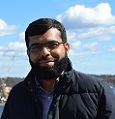Workshop Program Committee
- Asif Gill, University of Technology Sydney, Australia
- Muhammad Usman, Blekinge Institute of Technology, Sweden
- Azeem Akbar, Lappeeranta-Lahti University of Technology, Finland
- Siffat Ullah Khan, Malakand University, Pakistan
- Saqib Ali, Sultan Qaboos University, Oman
- Samuel Ajila, Carleton University, Ottawa, Canada
- Richard Lai, La Trobe University, Australia
- Sajid Anwer, Griffith University, Australia
Workshop Chairs

Sajjad Mahmood Associate Professor of software engineering at the Information and Computer Science Department, King Fahd University of Petroleum and Minerals, Saudi Arabia. He received his PhD from La Trobe University, Melbourne, Australia. Prior to pursing his PhD, he also worked as a software engineer in United States and Australia. He is an active researcher in the field of software engineering and has published more than 80 articles in peer reviewed journals and international conferences. He has worked as principal and co-investigators in a number of research projects that investigate issues related to global software development and secure software development. His research interests include empirical software engineering, evidence-based software engineering, global software development, secure software development and software process improvement in general.

Mohammad Alshayeb Professor at the Information and Computer Science Department, King Fahd University of Petroleum and Minerals, Saudi Arabia. He received his MS and PhD in Computer Science and certificate of Software Engineering from the University of Alabama in Huntsville in 2000, 2002 and 1999 respectively. Dr. Alshayeb worked as a senior researcher and Software Engineer and managed software projects in the United States and the Middle East. Dr. Alshayeb taught and coordinated industrial training courses. He provided consulting services to major industrial and educational institutes. Dr. Alshayeb is a member in the editorial board of the Software Engineering Journal, Journal of Software, Journal of Information Technology & Software Engineering and the Arabian Journal of Science and Engineering. Dr. Alshayeb received a number of certificates of excellence and appreciation from many companies. Dr. Alshayeb received Khalifa award for education as "the distinguished University Professor in the Field of Teaching within Arab World", 2016. He also received the "Excellence in Teaching", the "Excellence in Advising" award and the "Instructional Technology" awards from KFUPM. Dr. Alshayeb is a member of a number of professional associations. He is a certified project manager (PMP). Dr. Alshayeb’s research interests include empirical studies in Software Engineering, software refactoring, software quality, software measurement and metrics and object-oriented design.

Mahmood Niazi Professor of Software Engineering at the Information and Computer Science Department, King Fahd University of Petroleum and Minerals Saudi Arabia. He has received the MPhil degree from the University of Manchester, U.K., and the Ph.D. degree from the University of Technology Sydney, Australia. He has spent more than a decade with leading technology firms and universities as a Process Analyst, a Senior Systems Analyst, a Project Manager, and a Professor. He has participated in and managed several software development projects. Dr. Niazi is an active researcher in the field of empirical software engineering. Dr. Niazi has published over 100 articles He is interested in developing sustainable processes in order to develop systems, which are reliable, secure, and fulfil customer needs. His research interests are evidence-based software engineering, requirements engineering, sustainable, reliable and secure software engineering processes, global and distributed software engineering, software process improvement, and software engineering project management. Previously Dr. Niazi worked for Keele University UK, National ICT Australia, University of Technology Sydney Australia, University of Sydney Australia and University of Manchester UK.
CONTACT US
Sajjad Mahmood, Mohammad Alshayeb, Mahmood Niazi
- Information and Computer Science Department, King Fahd University of Petroleum and Minerals Dhahran, Saudi Arabia
- Interdisciplinary Research Center for Intelligent Secure Systems, King Fahd University of Petroleum and Minerals Dhahran, Saudi Arabia
- smahmood@kfupm.edu.sa
- alshayeb@kfupm.edu.sa
- mkniazi@kfupm.edu.sa